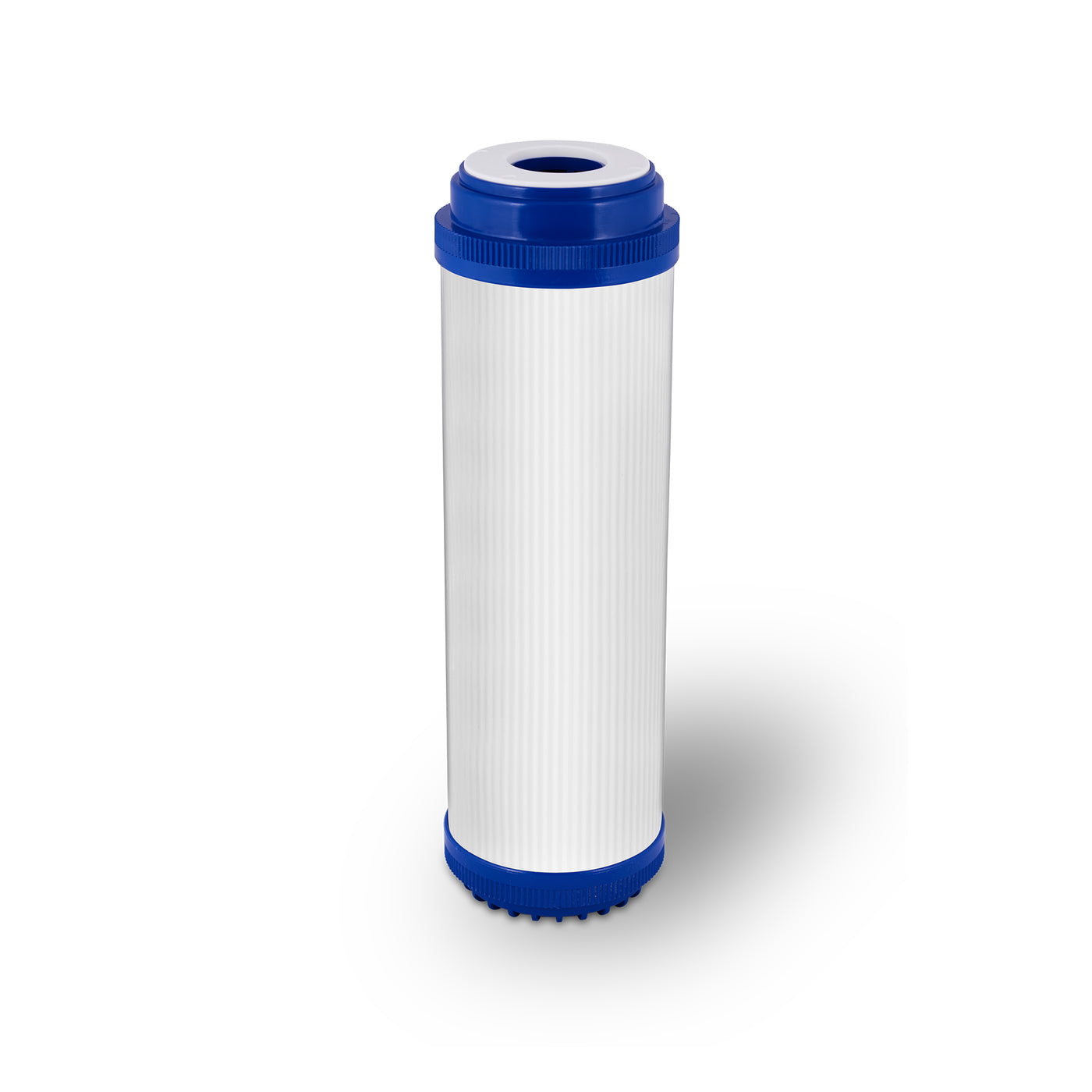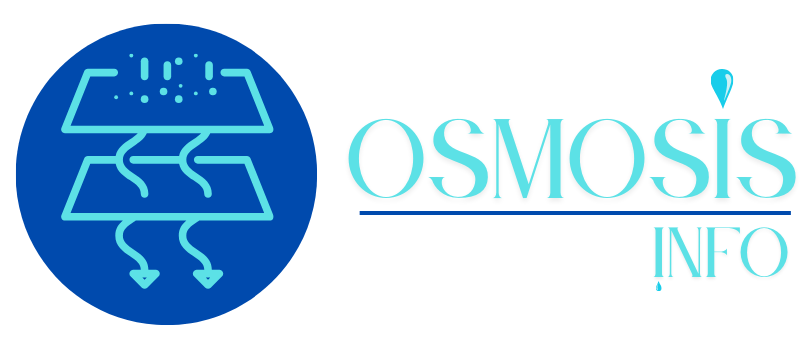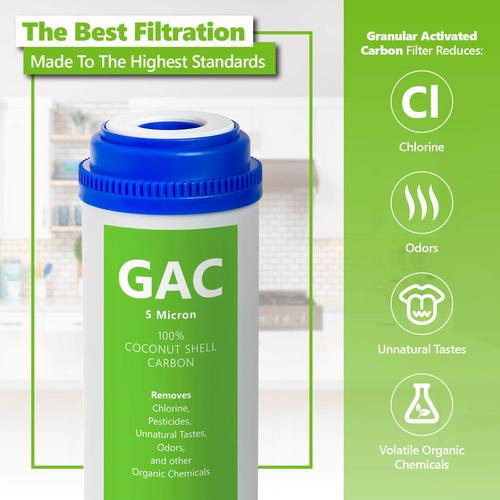Origins And Production Methods Of Granular Activated Carbon
Imagine water streaming through a maze of microscopic tunnels, emerging purified and fresh on the other side. That’s the promise of granular activated carbon, or GAC, a filtration medium whose roots stretch back to ancient civilizations that used charcoal to clarify water. Today’s GAC is born from carbon-rich sources such as coconut shells, coal, wood, or peat. These raw materials begin their journey in a carbonization step: they’re roasted at temperatures often exceeding 600°C in oxygen‐limited environments, driving off volatile compounds and concentrating the elemental carbon into a dense, charcoal-like matrix[1]. But carbonization alone only lays the groundwork; what transforms this charcoal into an adsorption powerhouse is activation.

Activation typically involves heating the carbonized material again, this time above 900–1,100°C, in the presence of steam or an oxidizing agent. This second thermal assault etches millions of micro‐ and mesopores into each granule, exploding the internal surface area so that a single teaspoon rivals a football field in adsorptive real estate[2]. It’s within these complex pore networks that contaminants—from chlorine and disinfection byproducts to pesticides and taste-and-odor molecules—become ensnared as water flows by. The fascinating bit is how a relatively simple heat treatment can craft a three-dimensional labyrinth of cavities, capillaries, and fissures that trap chemicals at the molecular level.
Once activated, the carbon granules are carefully graded and washed to remove any residual particulates and dust. Depending on the intended application—whether protecting a household drinking tap, polishing industrial wastewater, or scrubbing volatile organic compounds from air—the manufacturer may further treat the granules with acids or bases to enhance specific surface functionalities, or even impregnate them with catalytic metals to break down stubborn toxins. Beyond the initial performance, sustainability is baked into the GAC lifecycle. When the pores fill up, spent carbon can be thermally reactivated in specialized kilns, restoring up to 90% of its original adsorption capacity[5]. This regeneration cycle slashes waste and ensures that each batch of carbon can serve its purifying mission again and again, making GAC a cost-effective and eco-aware choice for keeping water and air crisp and clean.
Mechanism Of Action Of GAC Filters
Close your eyes and picture a vast, unseen forest of microscopic pores. Each granule of activated carbon is like a tiny tree, its branches extending through countless channels waiting to trap unwelcome visitors. As water sweeps through this forest, contaminants adhere to the carbon’s internal walls via adsorption—a process governed by Van der Waals forces, electrostatic attractions, and pore diffusion dynamics. Unlike simple sieving, which blocks particles above a certain size, adsorption leverages the carbon’s immense surface area to immobilize molecules ranging from chlorine and volatile organic compounds to taste-ruining phenols and pesticides[1].

Research by the U.S. Environmental Protection Agency’s Water Division highlights GAC’s prowess in capturing disinfection byproducts and organic solvents, with removal efficiencies often exceeding 90% when optimized for pore size and contact time[2]. The finer the pores—and the slower the flow rate—the more opportunity each contaminant molecule has to negotiate its way into a welcoming pore and stick. Of course, real-world success hinges on matching the carbon grade to the chemistry of the water. That’s why home units often pair GAC with sediment pre-filters and reverse osmosis membranes, as described in our detail on carbon water filters, to protect the carbon from rapid fouling and prolong its service life.
In everyday life, I’ve seen a murky tap transform into crystal-clear water after installing a GAC cartridge. Yet it’s vital to monitor performance: once the carbon’s adsorption sites saturate, its efficiency plummets, allowing tastes and odors to slip through. Regular maintenance or reactivation is therefore non-negotiable. And although GAC frameworks vary—from loose-bed vessels in industrial plants to tightly packed cartridges in under-sink units—the underlying magic remains the same: an expansive network of surfaces eager to embrace impurities, delivering safer, fresher water one drop at a time.
Versatile Applications Of GAC Filters
Granular activated carbon is the chameleon of the purification world, seamlessly shifting between water, wastewater, air filtration, and even niche roles like aquarium care. In drinking water treatment, GAC typically serves as the final polishing stage, removing residual chlorine and organic compounds that can affect taste and odor. Municipal plants often deploy large GAC vessels to safeguard public health by stripping disinfection byproducts that formed during chlorination processes, ensuring the water that pours from faucets is not only safe but also pleasant to drink.
Beyond potable water, GAC finds heavy use in industrial wastewater polishing. Facilities such as chemical manufacturers and plating shops rely on carbon columns to capture trace organics and solvents, helping them meet stringent discharge limits. The EPA’s studies show GAC can remove up to 90% of certain volatile organic compounds and pesticides from effluent streams, making it indispensable for compliance and environmental stewardship[2].
Air purification is yet another frontier. From large‐scale activated carbon scrubbers that cleanse factory fumes to compact filters in residential air purifiers, GAC adsorbs volatile organic compounds like benzene and formaldehyde, neutralizing odors and protecting respiratory health. Even aquarium enthusiasts swear by GAC cartridges to keep fish tanks crystal clear; the carbon removes tannins, leftover feed, and trace medications without altering pH or mineral balance[3]. Its adaptability shines because the same principles—adsorption, regeneration, and optimal contact time—apply whether you’re treating gallons of drinking water or purifying ambient air.
Selecting The Right Activated Carbon: Grain Size And Source Material
| Grain Size (mm) | Typical Flow Rate | Primary Application | Advantages | Drawbacks |
|---|---|---|---|---|
| 0.5 – 1.0 | Low | Taste & Odor Removal | High surface area, superior adsorption | Prone to channeling, higher pressure drop |
| 1.0 – 2.5 | Medium | Residential Water Filters | Balanced flow & adsorption | Moderate maintenance, some channeling |
| 2.5 – 4.0 | High | Industrial Effluent | Low pressure drop, robust flow | Lower adsorption per volume |
Choosing the ideal GAC starts with grain size. Fine granules under 1 mm maximize surface area—crucial for stripping trace organics and odors—but they also slow water flow and can cause higher pressure drops. Coarser granules above 2.5 mm allow higher throughput, making them a staple in industrial columns where large volumes demand rapid processing. Home systems usually settle on a sweet spot of 1–2 mm, balancing flow, contact time, and maintenance frequency[2].

The source material—whether coconut shell, bituminous coal, or wood—further tunes performance. Coconut-shell GAC boasts a rigid, microporous structure that excels at removing chlorine and flavor compounds. Coal-based carbons offer broader pore distributions ideal for capturing larger industrial chemicals, while wood-derived varieties deliver a versatile middle ground[4]. Expert filtrators often recommend coconut-shell carbon for kitchen sinks due to its hardness, low dust production, and exceptional taste-and-odor removal. For a deeper dive into how particle size shapes efficiency and contaminant profiles, see our exploration of micron-scale filtration impact.
Contact Time And Water Chemistry In GAC Filters
Even with a labyrinthine pore network offering a football-field’s worth of surface area[1], GAC’s magic requires time. Engineers use the concept of Empty Bed Contact Time (EBCT)—the duration water spends traversing the carbon bed—to optimize removal. For volatile organics and chlorine byproducts, an EBCT of 10–20 minutes is often recommended; any shorter, and molecules may slip past unadsorbed[2].
Water chemistry further complicates things. A shift as small as one pH unit can throttle adsorption capacity by up to 30%, as calcium and magnesium ions compete for pore space and push target molecules aside[4]. Pre-treatment steps—like softening or pH adjustment—often pay dividends by preserving GAC’s adsorption sites for the contaminants you actually care about. Industry case studies confirm that synchronizing longer contact times with balanced water chemistry can double removal rates, transforming murky tap water into pristine clarity[3].
DIY Homemade Carbon Filter for Sustainable Water Purification
Building your own carbon filter at home can be a surprisingly empowering project, turning kitchen scraps into a miniature purification system. Begin with three mason jars: layer pea gravel at the bottom to catch sediment, followed by washed, food-grade sand, and finally a generous layer of crushed charcoal—ideally from coconut shells for maximum adsorption. Secure the top with a coffee filter or fine mesh, then slowly pour water through the stack. As the water trickles, odors and chemicals cling to the charcoal’s pores, yielding clearer water in the jar below[1].
Feel free to experiment: swap in commercial GAC pellets for enhanced performance, or tweak your gravel-to-charcoal ratio to dial in flow rate. I’ve found that refreshing the charcoal layer every month and rinsing the entire assembly weekly keeps tastes crisp and prevents mustiness. While nothing beats a professionally engineered system, this DIY filter is a testament to the accessible power of adsorption and an eco-friendly way to cut down on single-use plastic bottles[2].
Cutting-Edge Activated Carbon Technology Innovations
Today’s GAC is not your grandfather’s charcoal. Advances in nanotechnology and materials science have unlocked ways to engineer pore structures with laser-like precision. By leveraging microwave activation or templated synthesis, manufacturers can create carbons with interconnected nanopores that speed up contaminant capture and dramatically reduce pressure drop[2]. Functionalization—infusing carbon surfaces with trace metals or catalysts—can even break down stubborn chlorinated solvents in situ, transforming toxins into harmless byproducts[3].
Greener production methods are also on the rise. Low-temperature steam activation cuts energy consumption in half, while 3D-printed carbon monoliths promise 25% higher flow rates before regeneration is needed. In lab trials, next-gen GAC systems have demonstrated a 30% extension in service life under heavy chlorine loads—and when paired with smart regeneration protocols, they could redefine cost-efficiency in both residential and industrial settings[5].
Sustainable Benefits And Environmental Impact
Granular activated carbon filters stand as a quiet hero in today’s sustainability story. By trapping pollutants at the molecular level and allowing for thermal regeneration, GAC systems reduce both waste and energy consumption. Facilities that commit to carbon reactivation can cut carbon emissions by more than 90% compared to sourcing fresh media each cycle[3]. And when you choose coconut-shell–based GAC, you’re endorsing lower mining impacts and more renewable feedstocks[4].
I never cease to marvel at how a handful of black granules—when properly engineered and managed—can defend our water and air against a host of invisible threats. With thoughtful design, routine maintenance, and responsible disposal, GAC filters don’t just purify; they empower us to steward resources wisely and sip confidently from the tap, knowing that the simple elegance of carbon is working tirelessly on our behalf.
Citations
- [1] WWD Magazine – What is Granular Activated Carbon (GAC)
- [2] Activated Carbon – Insights on Granular Activated Carbon
- [3] EPA – Adsorption Using Granular Activated Carbon
- [4] Minnesota PCA – Granular Activated Carbon Treatment
- [5] LikeFilter – How to Choose the Right Activated Carbon Filter: CTO or GAC
“`html
Complete Top Picks Comparison – 23 Products
| Product | Source | Price | Rating | Image | Buy |
|---|---|---|---|---|---|
| Marineland Black Diamond Premium Activated Carbon 22 Ounces, Filter Media For Aquariums | $9.88 | ★★★★☆ (4.7) |  | Buy on Amazon | |
| Fluval C2 Activated Carbon, Replacement Aquarium Filter Media, 3-Pack, 14011 | $6.99 | ★★★★☆ (4.7) |  | Buy on Amazon | |
| 1000 Replacement Fiter Compatible with 1000 Air Purifier, Integrated Efficiency Filter, Activated Carbon and Pre-filter, 2-Pack | $85.99 | ★★★★★ (5.0) |  | Buy on Amazon | |
| Cut to Fit Activated Carbon Filter Sheet 16” x 48” – Activated Carbon Air Filter for Air Purifiers Window AC Air Vent And More – Charcoal Filters Effectively Remove Odors & Freshens the Air (1-Pack) | $15.93 | ★★★★☆ (4.6) |  | Buy on Amazon | |
| Cut to Fit Carbon Air Purifier Filter Roll, 16x48x1/4 inches Size Activated Charcoal Dust Filter Sheet,Carbon Pad Replacement for Air Vent,AC,Range Hood,Pond,Compost Bin,Odor Absorbing | $13.09 | ★★★★☆ (4.2) |  | Buy on Amazon | |
| PUREBURG Carbon Filter,Cut-to-Fit Carbon Pad 16 x 48 inches for Air Filter Charcoal Sheet fits Range Hoods Furnace Filters removes Odor VOC Parts Accessories Replacement,1-Pack | $12.78 | ★★★★☆ (4.6) |  | Buy on Amazon | |
| ELEGOO Mini Air Purifier with Activated Carbon Filter and Universal Adaptor for LCD/DLP/MSLA Resin 3D Printer(Pack of 2) | $19.99 | ★★★★☆ (4.4) |  | Buy on Amazon | |
| ICEPURE 10″X4.5″,1 Microns Whole House Sediment Activated Carbon Water Filter Compatible with Dupont WFHDC8001,EP Series,EPM Series,CB-BB-10, GE FXHTC, GXWH40L, GXWH35F, GNWH38S, CTO10BB,1PACK | $31.99 | ★★★★☆ (4.5) |  | Buy on Amazon | |
| Refrigerator Air Filter Replacement 6 Pack – Carbon Activated Filter Compatible with Frigidaire & Electrolux Pure Air Ultra Reduce Odors for EAFCBF, PAULTRA, RAF1150 242061001,242047801, 242047804 | $16.99 | ★★★★☆ (4.7) |  | Buy on Amazon | |
| LEVOIT Genuine Core Mini-P Replacement Filter, Core Mini-RF Air Purifier Filters, Supports HEPA Sleep Mode, High-Efficiency Activated Carbon for Removal of Smoke, Odor, Allergens, Pollen, 2 Pack,White | $45.99 | ★★★★★ (4.8) |  | Buy on Amazon | |
| 2024 Used ZOTAC GeForce RTX 3070-8GD6 X-GAMING Video Cards RTX 3070 8GB GDDR6 256bit GPU Graphic Card | $125.91 | N/A |  | Buy on AliExpress | |
| VTOMAN FlashSpeed 1000 Portable Power Station 2000W 828Wh LiFeP04 Battery For Outdoor Camping Tent Travel | $273.52 | N/A |  | Buy on AliExpress | |
| Pool Filter Drain Plug Pool Pump Replacement Parts Water Outlet Nozzle Skimmer Cover Gasket Seal For Spa Tank Maintenance | $10.90 | N/A |  | Buy on AliExpress | |
| MAXSUN Graphics Cards RTX 4060 Terminator 8G GDDR6 GPU 128bit PCI Express 4.0 X8 Gaming Video Card Desktop Computer Components | $153.37 | N/A |  | Buy on AliExpress | |
| Sail Solar 48V 51.2V LiFePO4 Battery LV 6000 Cycle Times 100Ah 200Ah | $392.33 | N/A |  | Buy on AliExpress | |
| USED Video card RTX 3070M (3070 Laptop) 8GB 256Bit DDR6 Non LHR Perfectly Compatible With Mining BTC ETH Speed Reaches 65+MH/S | $119.60 | N/A |  | Buy on AliExpress | |
| Bincoo Transparent Coffee Cup Stainless Steel Long Filter Cold Extraction Cup Glass Soaking Cold Brewing Pot Office 500ml Water | $24.96 | N/A |  | Buy on AliExpress | |
| USED Graphics Card RTX 3060 12GB 8pin Placa De Video GAME NVIDIA GPU GDDR6 192bit HDMI*1 DP*3 PCI Express 4.0 x16 rtx 3060 12gb | $108.93 | N/A |  | Buy on AliExpress | |
| Petrol Filter Parking Heater Intake Filter Marine Water Separator Replacement Oil Filter Auto For Webasto/ Eberspacher | $6.94 | N/A |  | Buy on AliExpress | |
| ECOFLOW-Tracker solaire portable DELTA PRO / DELTA MAX, station d’alimentation pour le plein air, 30% | $681.89 | N/A |  | Buy on AliExpress | |
| 3-Stage Whole House Water Filter System 20″x4.5″ with Spin Down Sediment Filter | $289.99 | N/A |  | Buy on eBay | |
| Dreo Reverse Osmosis Water Filter Countertop, 7-Stage RO Water Filtration System | $169.99 | N/A |  | Buy on eBay | |
| Geekpure 5 Stage Under Sink Reverse Osmosis Drinking Water Filter System 75 GPD | $135.99 | N/A |  | Buy on eBay |
“`

